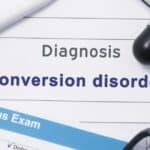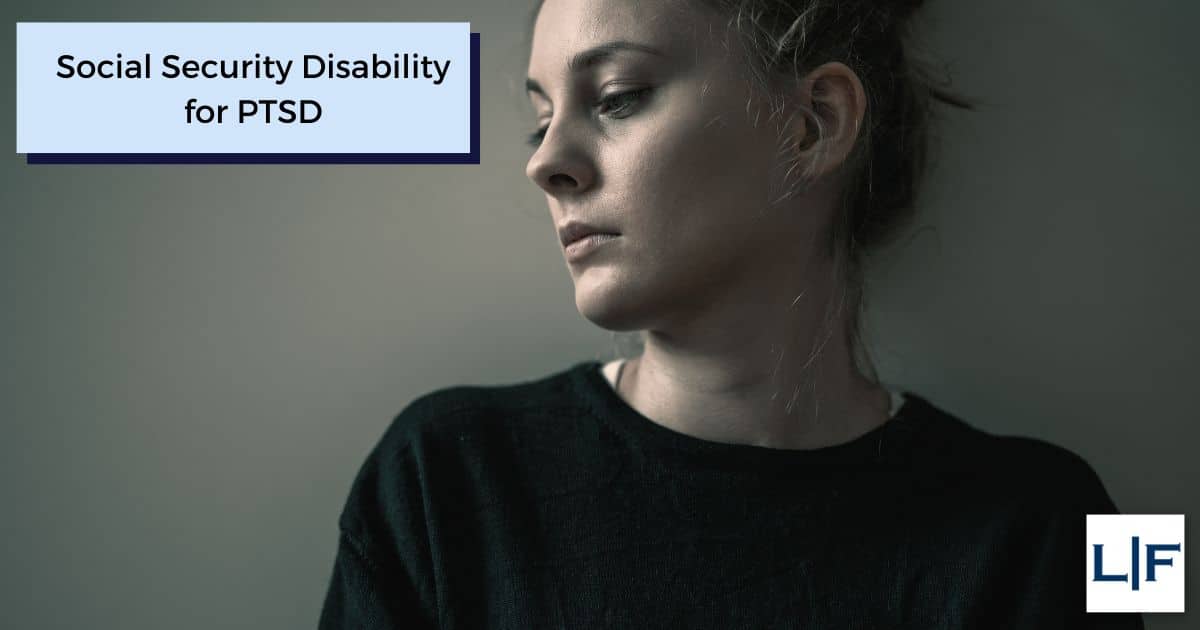Post-traumatic stress disorder (PTSD), which can develop after exposure to an extremely traumatic event, is not uncommon. According to the Department of Veterans Affairs (VA), approximately eight million adults have PTSD “during a given year.” Many people with PTSD respond well to treatments; however, for others, the symptoms — the nightmares, flashbacks, anxiety attacks, and persistent, paralyzing fears remain.
Those whose symptoms of mental illness greatly affect their daily affairs and who are not responsive to treatment may be able to qualify for Social Security disability benefits. To determine eligibility for Social Security disability for a post-traumatic stress disorder call our disability lawyers at Lunn and Forro, PLLC at 888-966-6566 and request a free consultation.
Does the SSA consider PTSD as a disability?
PTSD is one of the conditions in the Social Security Administration’s (SSA) Listing of Impairments, under Section 12.15: Trauma- and stressor-related disorders.
For PTSD to qualify as a disability, you must have evidence of all of the following:
- Experience with “actual or threatened death, serious injury, or violence”
- Involuntary “re-experiencing of the traumatic event” (e.g., flashbacks, intrusive memories, dreams)
- Avoidance of any events, places, things, etc. that remind you of the event
- Mood and behavior disturbances
- “Increases in arousal and reactivity”
You must also provide evidence of either A or B:
- A) Extreme or marked limitation of your ability to:
- Comprehend, recall, and apply information
- “Interact with others
- Concentrate, persist, or maintain pace
- Adapt or manage oneself”
You must prove an extreme limitation of one or a marked limitation of two.
- B) Ongoing treatment, therapy, support, or a “highly structured setting” intended to diminish the signs and symptoms of your PTSD; and “minimal capacity to adapt” to environmental or schedule changes.
What are the other criteria for disability benefits?
To collect disability benefits for PTSD, you will need to satisfy several basic but strict criteria. Specifically:
- You must either meet the criteria listed under Section 12.15, or your impairment or combination of impairments must prevent you from engaging in substantial gainful activity (SGA).
- Your condition must have lasted or be expected to last a year or more or result in death.
- Your impairment must greatly interfere with your ability to work at your job, despite treatment.
- Your condition, age, educational background, and residual capacities must be such that the SSA thinks you are unable to adjust to other work.
- Your monthly income must not exceed $1,170. If you are capable of earning more than that, the SSA will consider you engaged in SGA and therefore, not fully disabled.
There will be other requirements, as well, depending on whether you are applying for Social Security Disability Insurance or Supplemental Security Income. Disabled workers applying for Social Security Disability Insurance (SSDI) benefits will need to have a certain number of recent work credits to qualify. Disabled persons with limited income and assets that are applying for Supplemental Security Income (SSI) must be able to verify that their assets and income fall below a certain threshold.
What types of evidence do I need to prove my PTSD disability claim?
The SSA will want to see adequate evidence from acceptable medical and non-medical sources that verify your condition, its severity, and the effect your symptoms have on your ability to perform work-related tasks. You will want to submit your files from all of your treating physicians, including your general doctor, your psychiatrist, and your psychologist.
If you have high levels of catecholamine, altered levels of cortisol, and/or a decrease in the volume of your hippocampus — three biological factors that are characteristic of people with PTSD — your diagnostic test results can further support your claim.
The SSA will also take any information into consideration from acceptable non-medical resources, such as your employer, social worker, and family members about how your condition is impairing your ability to cope with work. If you are in group counseling, input from your group leader would be helpful, as well.
From our years helping disabled applicants, we can determine what the SSA is looking for and what documents will best prove your case. We will help you obtain that evidence to give you the best chance of receiving benefits.
Do I need a disability attorney for my disability claim based on PTSD?
Having a lawyer can mean all the difference to the outcome of your case. It can be challenging to win benefits based on a mental condition such as PTSD, which is harder to prove than conditions that are more physical in nature. Failure to provide adequate evidence, accidental mistakes, or omissions on paperwork, and a misunderstanding of the claims process can all result in denied benefits.
To reduce the chances of having your claim rejected, it is a good idea to enlist the help of a local disability lawyer. A lawyer can help you with all aspects of your disability claim, from initial filing to appeals. Plus, most disability lawyers, such as ours at Lunn & Forro, will help you with your case without upfront fees. We are only reimbursed for our services if you collect benefits.
Call our office today at 888-966-6566 to discuss your case with a PTSD disability lawyer in Raleigh today.
Related Posts

Can I Get Disability for Diabetes?
The short answer to the question is yes, there are people who receive Social Security disability benefits for diabetes. However, they do not get disability

Is Schizophrenia a Disability? – Social Security Disability Benefits
Schizophrenia is a severe mental illness that affects about 1 percent of the population. However, it tends to run in families so someone with a

Can You Get Disability for Conversion Disorder?
Conversion disorder is a mental illness that causes neurological symptoms, such as paralysis or hearing loss. It is one of several conditions that fall under

Getting Social Security Disability For a Stroke
Each year, approximately 800,000 Americans experience a stroke, reports the Centers for Disease Control and Prevention (CDC). Strokes are a leading cause of disability among
Getting Social Security Disability for a Mental Illness
There are various mental illnesses that can qualify someone for disability benefits. In fact, approximately one-third of disability beneficiaries received a mental disorder diagnosis in
Disability for Anxiety and Panic Attacks
Disability for anxiety and panic attacks is available to individuals who cannot work due to the severity of their symptoms. Panic disorders are not uncommon.
Is BPD a Disability? – Qualifying for Payment
Some people who suffer from Borderline Personality Disorder qualify for disability benefits. Personality disorders are characterized by unhealthy and rigid thoughts and behaviors that greatly
Is an Eating Disorder a Disability?
Can I get disability for an Eating Disorder? Eating disorders can cause a host of mental, emotional, and physical symptoms that can lead to serious



